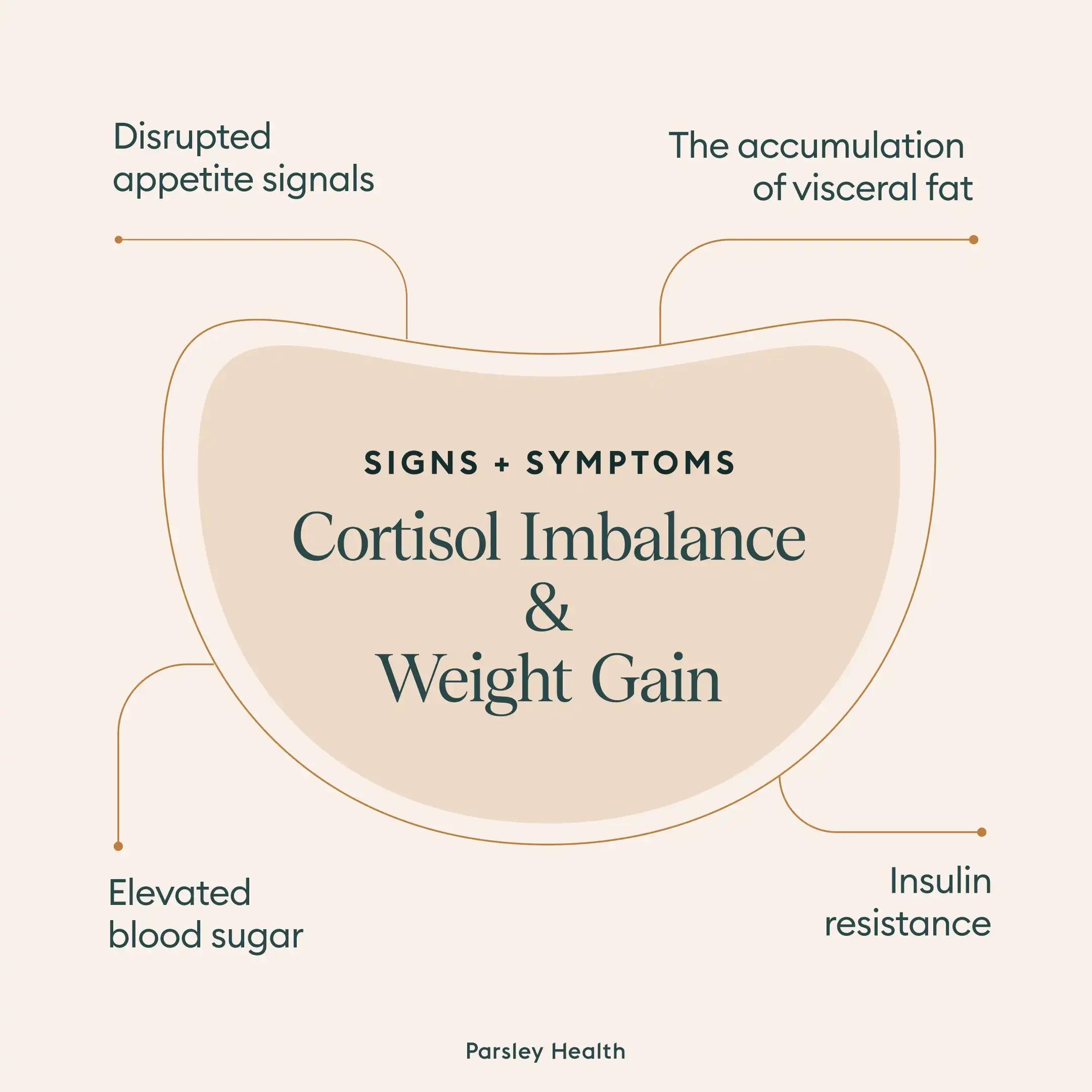The phrase “cortisol belly” isn’t a medical term. However, people sometimes use it to describe weight gain around the midsection. This is because cortisol, a steroid hormone, can lead to fat accumulation, often in the belly area.

We all need (adipose tissue) fat in our bodies to protect our organs, support hormones and cellular function, and more. However, too much cortisol can lead to visceral fat storage, which is associated with numerous chronic conditions. Keeping your cortisol level in check can help reduce your risk, improve your energy levels, and more.
Several factors can lead to high cortisol, and we’ll unpack them in this article. Since cortisol is associated with stress and is often called the “stress hormone,” people often think it is a bad thing. However, cortisol is crucial for the body. But a chronically high level, or dysregulated cortisol, is not good for us.
Here we’ll look at what cortisol is, what causes dysregulation and the related concerns, how to keep your cortisol level under control, and when to see a clinician for personalized care.
Understanding cortisol and its effects
Cortisol plays important roles in nearly all parts of your body. Your adrenal glands produce and release cortisol, which is a glucocorticoid. Glucocorticoids are steroid hormones.
“Cortisol is popularly known as the ‘stress hormone’ because it is released in the body to respond to stress,” says Catherine Gervacio, a registered nutritionist dietitian, certified exercise nutrition coach, and dietary consultant for WOWMD, a supplement brand. “It is important in our bodies because cortisol is needed for regulating metabolism, reducing inflammation, controlling blood sugar levels, and supporting the body’s fight-or-flight response.”
Cortisol also helps with your sleep-wake cycle. Your cortisol level typically peaks in the morning to get you up and going. Cortisol generally decreases throughout the day until you have your lowest levels at night around bedtime. You may have some fluctuations during the daytime, however. If your cortisol levels significantly deviate from the pattern of generally decreasing over the course of your day, you may have dysregulation.
Chronic stress
Chronic stress is one of the most common causes of dysregulated cortisol levels, Gervacio says. To understand why, we need to explore how our body responds to stress via our “fight-or-flight” response, which is controlled by our sympathetic nervous system.
Our fight-or-flight response is a survival mechanism that’s involved in both acute (immediate) and chronic (ongoing stress).
- Acute stress response. Your immediate response to stress starts in your brain. Your brain sends an emergency signal to your adrenal glands to release epinephrine, aka adrenaline, into your bloodstream. Adrenaline prompts the release of fats and glucose so you have energy to deal with an urgent threat. If the threat passes, your body will likely return to a calmer state.
- Chronic stress response. If you experience ongoing stress, your brain continues with the emergency alerts, leading to a hormonal domino effect. The hypothalamus, a part of the brain, releases corticotropin-releasing hormone. This signals the pituitary gland to release adrenocorticotropic hormone. And this tells the adrenal gland to release cortisol.
“Cortisol is one of the hormones that is activated when you’re under stress but should go back to normal once the stress has passed,” says Elizabeth Ward, MS, a registered dietitian and the author of “The Menopause Diet Plan, A Natural Guide to Managing Hormones, Health, and Happiness.”
Ages ago, humans had to be on high alert for predatory animals and other acute threats that eventually resolved. Nowadays, acute stressors might include having to give a presentation, experiencing a fender bender, getting into an argument with someone, and more. After these stressors, we should return to a calmer state.
However, little stressors can pile up over the course of a day, week, month, or even a year or longer. Plus, we can experience long-term instances of intense stress, such as going through a divorce or breakup, facing major money concerns, having a never-ending to-do list at work, and the like.
Chronic stress causes an overactivation of our fight-or-flight response. “People under chronic stress may not achieve a return to normal cortisol levels,” Ward says.
Our past traumas can also cause us to remain in a state of hypervigilance. This term describes how we may subconsciously always be monitoring for a threat, leading to chronic stress.
Poor sleep quality, lack of exercise, poor diet
Some lifestyle factors can lead to a dysregulated cortisol level, including your levels of sleep and physical activity and your diet. A lack of adequate sleep can result in dysregulated cortisol the next day, for example.
Research shows that exercise lowers your cortisol level. Physical activity is a positive stressor on the body because it helps you adapt to stress.
Think about sweating it out in a high-intensity interval training (HIIT) session. This can temporarily engage the fight-or-flight response, but then afterward, your body uses your rest-and-digest response to recover.
The more you practice flipping this switch from stress to relaxation, the more resilient to stress you become. A sedentary lifestyle, on the other hand, can ratchet up your stress response when a stressor strikes, leading to elevated cortisol.
A diet loaded with ultra-processed foods may also contribute to perceived stress, which could then elevate cortisol levels. These foods often contain added sodium, sugar, preservatives, and other chemicals that can cause hormonal disruption.
Exposure to toxins and environmental stressors
Chemicals in the environment, the products we use, and the foods we eat (and their packaging) can also impact cortisol levels. Some chemicals are considered endocrine-disruptors and can mess with the function of your adrenal glands, which produce cortisol.
Some of these chemicals are even called “obesogens,” meaning they can drive weight gain. Obesogens are prevalent in ultra-processed foods.
Endocrine disruptors
- Atrazine
- Bisphenol A (BPA)
- Dioxins
- Perchlorate
- Per- and polyfluoroalkyl substances (PFAS)
- Phthalates
- Phytoestrogens
- Polybrominated diphenyl ethers (PBDE)
- Polychlorinated biphenyls (PCBs)
- Triclosan
Obesogens in food
- Fructose (and high-fructose corn syrup)
- Trans fats
- Xenobiotics (contaminants, industrial chemicals, pesticides, environmental pollutants)
Adrenal gland tumors
Adrenal tumors are rare. Sometimes when one is present it can cause an abnormal cortisol level, however. Typically when this happens, a tumor causes Cushing’s syndrome. Symptoms include abdominal weight gain, sexual dysfunction, and elevated blood pressure.
Signs and symptoms of cortisol imbalance
Some common symptoms of cortisol dysregulation include changes in weight, physical health status, mental health status, and more.
Weight gain
Cortisol can cause weight gain because of several factors, including changes to how your body manages blood sugar and insulin, your appetite, and the way it stores fat.
Elevated blood sugar. Cortisol boosts the production of glucose in the liver. This process is called gluconeogenesis. Gluconeogenesis helps keep glucose elevated in the bloodstream. This is a mechanism to help you respond to threats. If you don’t use up that glucose, it eventually gets stored as fat, leading to weight gain. We often don’t use up the excess glucose from a stress response. Instead, we sit with stress rather than fleeing from predators like our ancestors did.
Insulin resistance. This hormone is required for your cells to uptake glucose from your bloodstream. Cortisol disrupts insulin release and impairs the hormone’s ability to work properly. If your body doesn’t use insulin effectively, you become insulin resistant. Insulin resistance over time can lead to weight gain. Furthermore, obesity also contributes to worsened insulin resistance. Insulin resistance can lead to prediabetes, Type 2 diabetes, and metabolic syndrome.
Disrupted appetite signals. Cortisol reduces glucagon-like peptide-1 (GLP-1). This hormone affects other hormones that signal to the brain when you’re hungry or full. Disruption to these hormones can cause us to overeat or feel constantly hungry. Research also shows that high cortisol can lead to emotional or stress eating. And we may even crave more ultra-processed foods as a result of stress. “Cortisol has the ability to increase appetite, especially for high-calorie and sugary foods,” Gervacio says. “Therefore, it encourages fat storage in the abdominal area.”
The accumulation of visceral fat. Visceral fat surrounds your organs and is associated with worsened health. It often worsens insulin resistance. “Visceral fat is inflammatory, resulting in a greater risk for several conditions such as Type 2 diabetes, cardiovascular disease, and certain types of cancer, including breast and colorectal cancers,” Ward says. “Visceral fat also contributes to muscle tissue breakdown.”
Fatigue, insomnia, mood changes
High cortisol can lead to insomnia or other sleep issues. If your cortisol level doesn’t lower by bedtime, you may feel tired but wired and unable to sleep. A lack of sleep can further disrupt your cortisol level and lead to fatigue. Over time, a high cortisol level may also lead to depression, anxiety, and other mood changes.
Digestive changes
Your brain and gut communicate with each other through what’s called the gut-brain axis. Stress can affect the health of your digestive tract, leading to constipation, diarrhea, heartburn, nausea and vomiting, and more.
Skin issues
Your brain also communicates with your skin. Stress can trigger changes, including acne, dermatitis, itching, hives, and eczema or psoriasis flares.
High blood pressure
If you’ve noticed an elevation in your blood pressure, you may have a high cortisol level. Your blood pressure elevates naturally in response to stress as a survival mechanism.
However, after a stressor has passed, your blood pressure should return to baseline. If it stays elevated, chronic stress may be a culprit. Don’t ignore high blood pressure, as it could result in serious cardiovascular events.
Reducing cortisol levels and weight gain
You are not at the mercy of a high cortisol level. The first step is to talk to a clinician who can help you understand why you have a high cortisol level. If you have an underlying condition, such as an adrenal gland tumor (which is rare), that will need to be treated. However, in the absence of a tumor, lifestyle changes can help.

Manage your stress level
Many techniques can help you switch off your fight-or-flight response and turn on your rest-and-digest response. The more you practice flipping the switch, the more effective you become at managing stress. Practice meditation, yoga, breathwork, or a combination.
Don’t forget to get good quality and quantity sleep, as well. Sleep helps you recover from stress. Aim for at least seven hours per night and try to minimize disruptions from noise or light pollution.
Exercise is also an excellent way to mitigate stress and make you more resilient to it. Aim for 150 minutes of moderate-intensity aerobic exercise per week. And schedule at least two resistance-training sessions that help you build and preserve muscle.
Dietary changes
Some dietary changes can also help reduce your stress level. Eliminate ultra-processed foods as much as possible. The additives in these foods can contribute to higher stress and cortisol levels.
Eat more omega-3 fatty acids. Omega-3s lower inflammation and cortisol and boost your body’s natural recovery abilities. Some herbs can also help fight fatigue and help you better manage stress. These include adaptogens.
FAQ
What does cortisol do to the body?
Cortisol is a crucial hormone that is involved in many bodily processes, including the stress response. However, dysregulated levels of cortisol can lead to weight gain, physical and mental health issues, sleep disturbances, fatigue, and more.
What causes high cortisol levels in people assigned female at birth?
Chronic stress is the most common cause of dysregulated cortisol.
How do I know if I have cortisol belly?
“Cortisol belly” is not a medical term. However, high cortisol levels can lead to weight gain around the abdomen.
How do you flush cortisol out of your body?
You cannot flush cortisol out of your body, because you cannot live without this crucial hormone. If you have a dysregulated cortisol level, you can make lifestyle changes to address it. In rare cases, an adrenal gland tumor can cause high cortisol.
What happens if cortisol is too high?
If your cortisol level is dysregulated, you may experience weight gain, mental health changes, skin issues, digestive issues, high blood pressure, and chronic health conditions.






